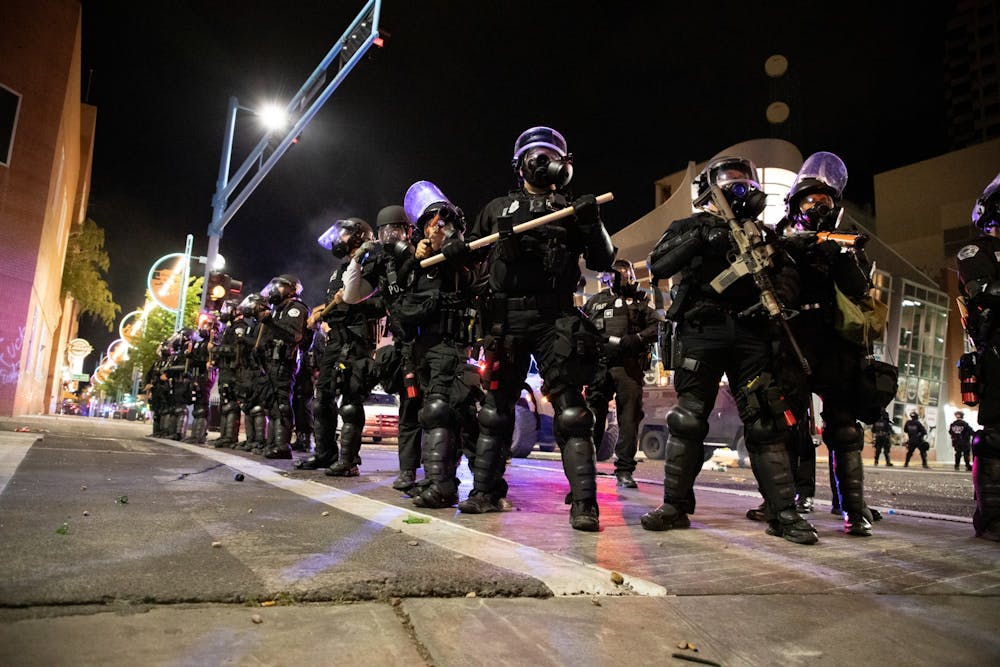In the month since Minneapolis police officer Derek Chauvin murdered George Floyd, police unions have come under national scrutiny for their role in shielding the police from accountability.
And Albuquerque has been no exception.
The contract between the Albuquerque Police Officers Association (APOA) and the City of Albuquerque was set to expire on July 1, but because all city union contract negotiations have been put on hold amidst the pandemic, it will remain in effect until negotiations can take place at an undetermined date in the fall.
“Negotiations for all of the City’s unions, including the APOA, are currently on hold due to uncertainty about finances in the wake of COVID-19,” Jessie Damazyn, a spokesperson for Albuquerque Mayor Tim Keller’s office, said.
From the way that police officers’ records are maintained to how internal investigations are conducted, the contract includes stipulations that protect officers, as is standard in any collective bargaining agreement. But it also gives officers accused — and found guilty — of wrongdoing a wide range of rights and benefits.
For instance, the investigation and discipline section of the contract mandates that when a complaint is made, the name of the citizen or fellow officer making the complaint is disclosed to the officer being investigated.
Get content from The Daily Lobo delivered to your inbox
If disclosure of the name would jeopardize the investigation, it’s not required. When the investigation is complete, however, the name of the complainant is revealed at the request of the officer, along with a copy of the official complaint.
This rule, along with several others governing misconduct investigations, is in place because of the Peace Officer’s Employer-Employee Relations Act. Gov. Michelle Lujan Grisham didn’t allow a bill that would have changed that law to be heard during the special session.
“Barriers to accountability don’t belong in a union contract, much less state statute,” Rep. Antonio “Moe” Maestas, who represents parts of Bernalillo County, said.
Per another section of the contract, derogatory material can be purged from an officer’s departmental file within 12 months at the department head’s discretion. Police union contracts in cities throughout the country — including Chicago, Long Beach and San Antonio — have similar provisions.
“The anti-accountability provisions for APD must be removed before the city signs the new agreement,” Maestas said.
After negotiations, the City Council will vote on the contract before it moves to Keller for his signature. However, councilors are prohibited from taking part in negotiations due to a provision in the City’s Labor Management Relations Ordinance §3-2-18.
“Their authority is only to accept the economic components of the collective bargaining agreements, subject to availability of funds,” City Council director Stephanie Yara told the Daily Lobo in an email. “The Mayor, through the chief administrative officer, has the authority to negotiate all other terms.”
In other words, the only City representative who can negotiate these changes with the union is Sarita Nair, the city’s chief administrative officer.
Because of this legal stipulation, City Councilors are largely unaware of the details of the contract.
“I have not been paying attention and, generally, the City Council lawyers advise legislators to stay out of the collective bargaining process,” Councilor Don Harris said. “Chris (Melendrez, the City Council’s attorney) will cut us off at Council meetings if we start asking about it.”
The contract was last negotiated two years ago and signed by Keller and APOA President Shaun Willoughby, who, over the past month, has been a vocal opponent of calls to defund the police.
Talking to KOAT about the push to defund, Willoughby said, “It infuriates me ... Any politician, whether they’re local or national, that is on board with defunding the police is ignorant, pandering and not talking about the conversation.”
APOA also opposed a bill passed during the special session that will require law enforcement statewide to wear body cameras.
“We are so disappointed in our legislators today,” the union wrote on Facebook. “We agree with reform efforts and in fact we believe that cameras are an important part of modern day policing, but to pass legislation without talking or working with law enforcement is wrong.”
While APOA has repeatedly claimed it supports police reform, Willoughby was in favor of Keller’s decision to file a motion earlier this year requesting that APD be released from some of the requirements laid out in the Department of Justice’s consent decree.
“The City of Albuquerque is asking for nothing more than what they’ve already earned,” Willoughby said. “We have worked our tails off, and the Albuquerque Police Department deserves this win.”
In 2018 and 2019, APD shot and killed eleven people, according to the Washington Post’s police shootings database.
The father of Kenneth Ellis III, a 25-year-old veteran with PTSD who was shot and killed by an APD detective ten years ago in front of a gas station after holding a gun to his own head, spoke out against the city’s move to scale back police monitoring.
“That was absolutely a slap in the face, absolutely an immoral route to be taking,” Ellis said. “I mean, I think if the mayor had a son and he got killed by the police, he would have a different view on it.”
Ellis’ family was awarded $10.3 million in damages in a wrongful death lawsuit filed against the city, which was later reduced to $7.95 million in a settlement agreement.
Earlier this month, the Minneapolis Police Department withdrew from negotiations over the department’s union contract because, the police chief said, it needs to be redesigned to give more transparency and room for true reform.
Keller’s office said when negotiations start, there will be an opportunity for the public to weigh in.
Bella Davis is a senior reporter at the Daily Lobo. She can be contacted at news@dailylobo.com or on Twitter @bladvs






